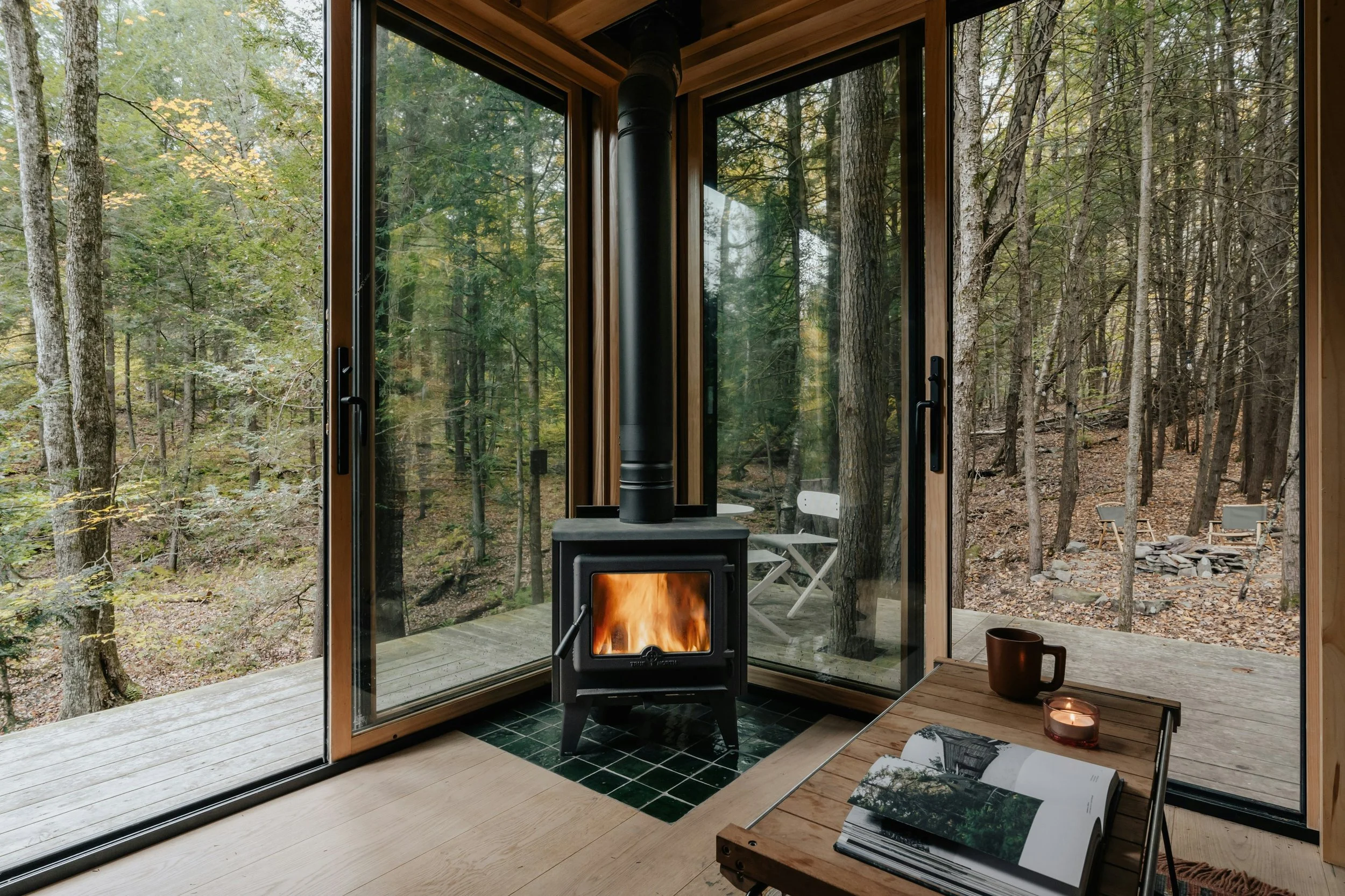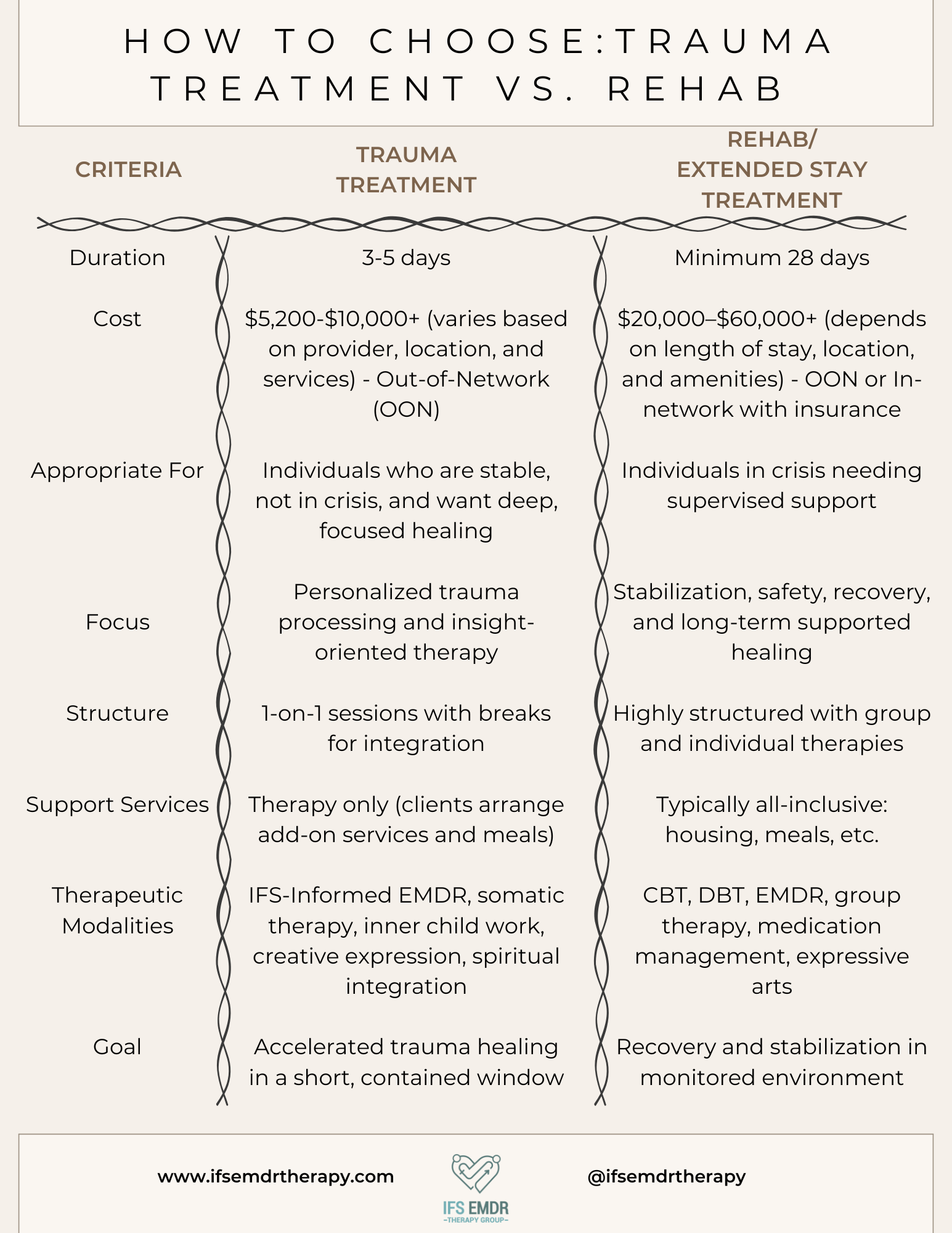Intensive Retreat or Residential? Choosing the Right Type of Healing Space for Complex Trauma
Last updated 1/22/2026
When it comes to healing from complex trauma, not all healing spaces are created equal—and that’s a good thing. Your path to recovery is deeply personal, and choosing the right environment can make all the difference. Two powerful options often considered are therapy retreats for trauma recovery and extended-stay residential treatment programs. Both serve important but distinct purposes.
So how do you know which is right for you? Below, we’ll break down the differences between a trauma retreat vs. residential treatment, and help you determine which healing container best fits your needs.
_______________________________________________________________________
Ready for deeper healing?
If you’ve resonated with this post, you may be a good fit for IFS-informed EMDR therapy designed for people who feel stuck in therapy.
_______________________________________________________________________
Photo by Clay Banks on Unsplash
What is an Intensive Trauma Retreat?
An intensive therapy retreat is a short-term, individualized healing experience that typically lasts 3–5 days. This type of retreat is ideal for individuals who:
Are not currently in crisis and want deep focused healing
Have a stable foundation of daily functioning, including an established therapist to return to after the trauma retreat
Are aware of trauma patterns and ready to engage in deep, focused, body-based work
Feel called to take intentional time away from daily life for self-exploration and trauma recovery
These retreats offer highly-personalized care. Sessions may include modalities such as IFS-Informed EMDR, somatic therapy, mindfulness-based resourcing, or inner child work. The schedule is tailored to your specific goals and needs—making it a powerful “deep dive” into your inner world without the commitment of a 28-day program.
Therapy retreats often feel more spacious and flexible. They’re a la carte in design: one-on-one sessions, breaks for integration, optional nature-based or body-based practices, and time for reflection. They’re an ideal reset for those who want to move through stuck trauma responses in a concentrated window of time—with the support of an experienced trauma therapist.
What Is a Rehab or Extended-Stay Trauma Recovery Program?
An extended stay residential or trauma recovery center is typically a minimum 28-day program that offers a highly structured and immersive healing environment. This option may be more appropriate for those who:
Are in active crisis or have recently experienced a destabilizing crisis
Are struggling with addiction, eating disorders, acute suicidal ideation, or dysregulation that impacts daily safety or functioning
Need round-the-clock support, accountability, and structure
Benefit from group programming, medical oversight, or community-based healing
_______________________________________________________________________
Ready for deeper healing?
If you’ve resonated with this post, you may be a good fit for IFS-informed EMDR therapy designed for people who feel stuck in therapy.
_______________________________________________________________________
Photo by Hannah Busing on Unsplash
These programs include a wrap-around model of care—often providing meals, housing, daily group therapy, psychoeducation, and recreational or expressive arts therapies. The structure is helpful for those needing a safe container for stabilization before engaging in deeper trauma processing.
If your nervous system is overwhelmed, or you’ve tried to heal on your own and keep looping back into crisis, a residential trauma recovery program may offer the scaffolding you need to safely begin healing.
Still Unsure?
If you’re uncertain whether you’re a better fit for a therapy retreat or a residential program, here are a few guiding questions:
Am I currently in emotional, physical, or relational crisis?
Do I have the capacity to care for myself during a short intensive?
Do I have supports to return to after a brief 3-5 days intensive?
Have I already done some therapy work and want to go deeper?
Am I looking for short-term personalized support, or longer-term comprehensive care?
Both healing spaces are incredibly valuable—it’s not about which is “better,” but about what you need right now. Often those who want to do a trauma retreat but need some time to stabilize will do an extended-stay and then come to do a trauma retreat program after they integrate back into their daily lives.
Final Thoughts
Healing from complex trauma is not one-size-fits-all. Whether you choose a therapy retreat for trauma recovery or an extended rehab program, know that your desire to heal is already a powerful beginning.
If you’re feeling stable but know it’s time for deeper work, a trauma retreat offers a sacred pause—a chance to tune in, process, and reconnect to your true self in an intentional, supported way.
If you’re in a place where daily life feels unmanageable, choosing a rehab program is a brave and necessary step toward safety, stability, and healing.
_______________________________________________________________________
Ready for deeper healing?
If you’ve resonated with this post, you may be a good fit for IFS-informed EMDR therapy designed for people who feel stuck in therapy.
_______________________________________________________________________
Interested in a personalized therapy retreat?
Explore our IFS-Informed EMDR therapy retreats designed for deep transformation in a supportive, nature-based setting.
👉 Learn more about our retreats here.
More Reading:
Is a 4-Day Therapy Intensive Right for You? Here’s What to Expect.
Authorship: This blog was written by Morgan Levine, LCSW (licensed in MD, DC, VA, PA, and CO). Morgan specializes in intensive EMDR therapy and IFS-Informed EMDR therapy, offered in-person in her office or in Immersive Intensive Retreats, as well as virtually. Morgan is passionate about working with adults who want deeper healing and are ready to get unstuck from patterns of perfectionism, overworking, anxiety, depression, PTSD, ADHD, obsessions and compulsions, relationship issues, CPTSD, use of substances or people, attachment wounds, and specific trauma events. Artwork created by Katy Levine, LMSW (no relation to Morgan). Katy focuses on supporting clients with complex trauma history, attachment wounding, anxiety, and perfectionism, using IFS-informed EMDR.
Disclaimer: The information in this blog is provided for educational and informational purposes only. It is not intended to be a substitute for mental health care nor a recommendation or endorsement for any particular treatment plan, organization, provider, professional service, or product. The information may change without notice. No claims, promises, or guarantees are made about the completeness, accuracy, currency, content or quality of information linked. You assume all responsibility and risk for any use of the information.



